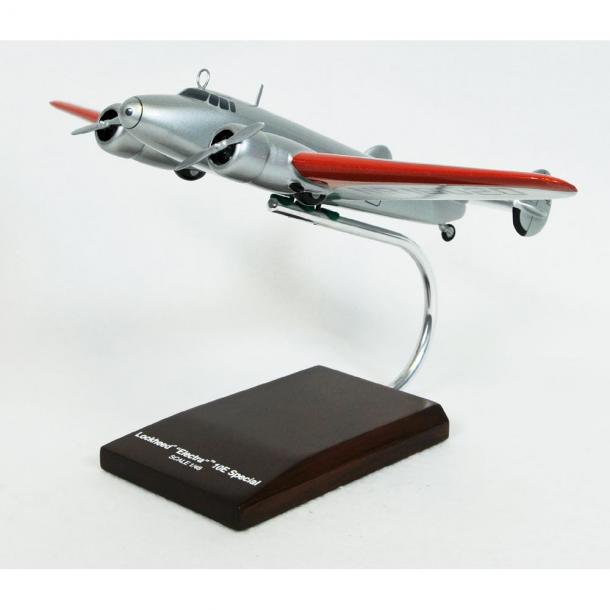L-10E ELECTRA MODEL

Produced in 1934, the L-10 Electra was the first all-metal, twin-engine transport monoplane developed by the Lockheed Aircraft Corporation. It was originally designed as an economical airliner with high performance and multi-engine reliability that would compete with the Boeing 247 and Douglas DC-2. The L-10 could carry ten passengers and a crew of two. It was in service throughout the continental United States, Alaska, Mexico, Central America and South America. The name Electra came from a star in the Pleiades.
Wind tunnel work on the Electra was undertaken at the University of Michigan. Much of the work was performed by a student assistant, Clarence Johnson. He suggested two changes be made to the design: changing the single tail to double tails, which would later become a Lockheed trademark, and deleting oversized wing fillets. Both of these suggestions were incorporated into production aircraft.
Noted American aviation pioneer and womens rights advocate Amelia Earhart flew a modified L-10E on an attempt to make a circumnavigational flight in 1937. The L-10E variant, which was fitted with new engines, was the only airframe and engine combination capable of carrying the extraordinarily heavy fuel loads required for the long legs planned for that flight. In July 1936, Earhart started planning a round-the-world flight. Not the first to circle the globe, it would be the longest at 29,000 miles, following a grueling equatorial route. Although the Electra was publicized as a “flying laboratory”, little useful science was planned and the flight seems to have been arranged around Earharts intention to circumnavigate the earth along with gathering raw material and public attention for her next book. On July 2, 1936, Earhart her navigator, Fred Noonan, disappeared over the central Pacific Ocean during the circumnavigational flight attempt. Despite an unprecedented search by the US Navy and US Coast Guard, no physical evidence of Earhart, Noonan or the L-10E was ever found.

Отзывы ещё не добавлены